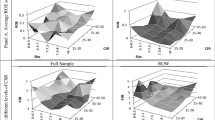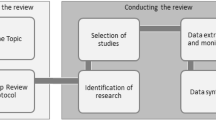Abstract
This article proposes a unified theory of the relationship between corporate social performance (CSP) and corporate financial performance (CFP). The theory provides a framework for rationalizing the various and contradictory findings in past empirical research. The theory is based on the parallels between the business and CSR domains, and thus draws on models from economics.
Similar content being viewed by others
References
Agle B. R., Mitchell R. K. and Sonnenfeld J. A. (1999). Who Matters to CEOs? An Investigation of Stakeholder Attributes and Salience, Corporate Performance, and CEO Values. Academy of Management Journal 42:507–525
Berman S. L., Wicks A. C., Kotha S. and Jones T. M. (1999). Does Stakeholder Orientation Matter? The Relationship between Stakeholder Management Models and Firm Financial Performance. Academy of Management Journal 42:488–506
Bowman E. H. and Haire M. (1975). A Strategic Posture toward Corporate Social Responsibility. California Management Review 18(2):49–58
Donaldson T. and Preston L. E. (1995). The Stakeholder Theory of the Corporation: Concepts, Evidence, and Implications. Academy of Management Review 20:65–91
Eisenhardt K. M.(1988). Agency – and Institutional – Theory Explanations: The Case of Retail Sales Compensation. Academy of Management Journal 31:488–511
Freeman R. E. (1984). Strategic Management: A Stakeholder Approach. Pitman, Boston
Frooman J. (1997). Socially Irresponsible and Illegal Behavior and Shareholder Wealth: A Meta-analysis of Event Studies. Business and Society 36:221–249
Graffland J. J. (2002). Modelling the Trade-off between Profits and Principles. De Economist 150:129–154
Griffin J. J. (2000). Corporate Social Performance: Research Directions for the 21st Century. Business and Society 39:479–491
Griffin J. J. and Mahon J. F. (1997). The Corporate Social Performance and Corporate Financial Performance Debate: Twenty-Five Years of Incomparable Research. Business and Society 36:5–31
Jensen C. J. (2001). Value Maximization, Stakeholder Theory, and the Corporate Objective Function. Business Ethics Quarterly 12(2):235–256
Jones T. (1995). Instrumental Stakeholder Theory: A Synthesis of Ethics and Economics. Academy of Management Review 20:404–437
Jones T. M. and Wicks A. C. (1999). Convergent Stakeholder Theory. Academy of Management Review 24:206–221
Margolis, J. D. and Walsh, J. P.: 2001, Misery Loves Companies: Whither Social Initiatives by Business?, Harvard Business School: Social Enterprise Series No. 19
McGuire J. B., Sundgren A. and Schneeweis T. (1988). Corporate Social Responsibility and Firm Financial Performance. Academy of Management Journal 31(4):854–872
McWilliams A. and Siegel D. (2001). Corporate Social Responsibility: A Theory of the Firm Perspective. Academy of Management Review 26:117–127
Mellahi K. and Wood G. (2003). The Role and Potential of Stakeholders in ‘Hollow Participation’: Conventional Stakeholder Theory and Institutionalist Alternatives. Business and Society Review 108:183–202
Mitchell R. K., Agle B. R. and Wood D. J. (1997). Toward a Theory of Stakeholder Identification and Salience: Defining the Principle of Who and What Really Counts. Academy of Management Review 22:853–886
Murray K. B. and Montanari J. R.(1986). Strategic Management of the Socially Responsible Firm: Integrating Management and Marketing Theory. Academy of Management Review 11(4):815–827
Orlitzky M., Schmidt L. F. and Rynes S. L. (2003). Corporate Social and Financial Performance: A Meta-analysis. Organization Studies 24(3):403–441
Pava M. L. and Krausz J. (1996). The Association between Corporate Social-responsibility and Financial Performance: The Paradox of Social Cost. Journal of Business Ethics 15:321–357
Preble J. F. (2005). Toward a Comprehensive Model of Stakeholder Management. Business and Society Review 110(4):407–431
Preston L. E. and O’Bannon D. P. (1997). The Corporate Social–Financial Performance Relationship: A Typology and Analysis. Business and Society 36:419–429
Roman R. M., Hayibor S. and Agle B. R.(1999). The Relationship Between Social And Financial Performance: Repainting a Portrait. Business and Society 38:109–125
Rowley T. and Berman S. (2000). A Brand New Brand of Corporate Social Performance. Business and Society 39:397–418
Simpson G. W. and Kohers T. (2002). The Link Between Corporate Social and Financial Performance: Evidence from the Banking Industry. Journal of Business Ethics 35:97–109
Sturdivant F. D. and Ginter J. L. (1977). Corporate Social Responsiveness: Management Attitudes and Economic Performance. California Management Review 19(3):30–39
Ullmann A. A. (1985). Data in Search of a Theory: A Critical Examination of the Relationships among Social Performance, Social Disclosure, and Economic Performance of U.S. Firms. Academy of Management Review 10:540–557
Waddock S. A. and Graves S. B.(1997). The Corporate Social Performance–Financial Performance Link. Strategic Management Journal 18: 303–319
Williamson O. E. (1985). The Economic Institutions of Capitalism. New York, Free Press
Wood D. J. and Jones R. E. (1995). Stakeholder Mismatching: A Theoretical Problem in Empirical Research on Corporate Social Performance. International Journal of Organizational Analysis 3:229–267
Author information
Authors and Affiliations
Corresponding author
Rights and permissions
About this article
Cite this article
Marom, I.Y. Toward a Unified Theory of the CSP–CFP Link. J Bus Ethics 67, 191–200 (2006). https://doi.org/10.1007/s10551-006-9023-7
Published:
Issue Date:
DOI: https://doi.org/10.1007/s10551-006-9023-7




